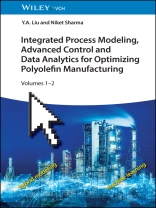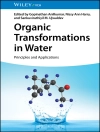Integrated Process Modeling, Advanced Control and Data Analytics for Optimizing Polyolefin Manufacturing
Detailed resource on the ‘Why, ‘ ‘What, ‘ and ‘How’ of integrated process modeling, advanced control and data analytics explained via hands-on examples and workshops for optimizing polyolefin manufacturing.
Integrated Process Modeling, Advanced Control and Data Analytics for Optimizing Polyolefin Manufacturing discusses, as well as demonstrates, the optimization of polyolefin production by covering topics from polymer process modeling and advanced process control to data analytics and machine learning, and sustainable design and industrial practice. The text also covers practical problems, handling of real data streams, developing the right level of detail, and tuning models to the available data, among other topics, to allow for easy translation of concepts into practice.
Written by two highly qualified authors, Integrated Process Modeling, Advanced Control and Data Analytics for Optimizing Polyolefin Manufacturing includes information on:
* Segment-based modeling of polymer processes; selection of thermodynamic methods; estimation of physical properties for polymer process modeling
* Reactor modeling, convergence tips and data-fit tool; free radical polymerization (LDPE, EVA and PS), Ziegler-Natta polymerization (HDPE, PP, LLPDE, and EPDM) and ionic polymerization (SBS rubber)
* Improved polymer process operability and control through steady-state and dynamic simulation models
* Model-predictive control of polyolefin processes and applications of multivariate statistics and machine learning to optimizing polyolefin manufacturing
Integrated Process Modeling, Advanced Control and Data Analytics for Optimizing Polyolefin Manufacturing enables readers to make full use of advanced computer models and latest data analytics and machine learning tools for optimizing polyolefin manufacturing, making it an essential resource for undergraduate and graduate students, researchers, and new and experienced engineers involved in the polyolefin industry.
Tabella dei contenuti
1. Introduction to Integrated Process Modeling, Advanced Control, and Data Analytics in Optimizing Polyolefin Manufacturing
2. Selection of Property Methods and Estimation of Physical Properties for Polymer Process Modeling
3. Reactor Modeling, Convergence Tips and Data-Fit Tool
4. Free Radical Polymerizations: LDPE and EVA
5. Ziegler-Natta Polymerization: HDPE, PP, LLPDE and EPDM
6. Free Radical and Ionic Polymerizations: PS and SBS Rubber
7. Improved Polymer Process Operability and Control through Steady-State and Dynamic Simulation Models
8. Model-Predictive Control of Polyolefin Processes
9. Application of Multivariate Statistics to Optimizing Polyolefin Manufacturing
10. Applications of Machine Learning to Optimizing Polyolefin Manufacturing
11. A Hybrid Science-Guided Machine Learning Approach for Modeling Chemical and Polymer Processes
Circa l’autore
Y.A. Liu, Alumni Distinguished Professor at Virginia Tech, is an award-winning teacher of sustainable design and practice, and industrial sustainable design projects. American Society for Engineering Education honored Liu with the George Westinghouse Award for excellence in engineering education and Fred Merryfield Design Award for excellence in teaching and research of sustainable design. The Chemical Manufacturers Association honored Liu with the National Catalyst Award for excellence in chemical education.
Niket Sharma received his Ph D in chemical engineering and M. Eng. in computer science with specialization in machine learning from Virginia Tech in 2021. He is currently a Senior Engineer at Aspen Technology, Boston, where he is working on the development of machine learning and hybrid modeling applications combining chemical engineering and data science principles. His Ph.D. dissertation focused on integrated process modelling and big data analytics for optimizing polyolefin manufacturing.












